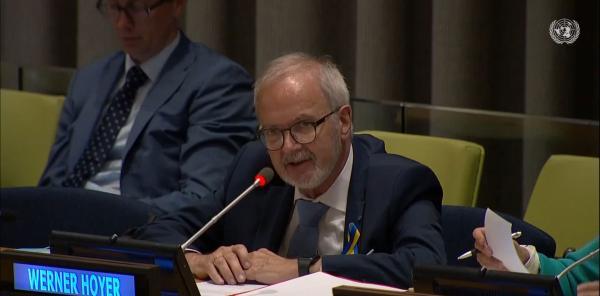
On 25 April EIB President Werner Hoyer participated in the United Nation’s Economic and Social Council (ECOSOC) Forum on Financing for Development. Together with Mrs Rebeca Grynspan, Secretary-General of United Nations Conference on Trade and Development, Mr Aiyaz Sayed-Khaiyum, Minister of Economy of Fiji and others, President Hoyer discussed how the availability of sustainable finance can be ensured despite current and future threats.
President Hoyer highlighted that past financial and economic crises as well as the COVID-19 pandemic have put a great strain on global public finances and debt sustainability for many vulnerable countries. The brutal invasion of Ukraine by Russia is not only causing terrible human loss and suffering in the Ukraine itself, but the resulting impact on energy and food security for the world’s poorest countries is being massively felt. President Hoyer emphasized the important role Mulitlateral Development Banks like the EIB can play in ensuring that needed investments are impactful with high socio-economic rates of return, thus reducing the debt-burden on countries over time.
The financing requirements to tackle climate change, improve resilience and adaptation, education, digitalization and health are already enormous and will be all the more difficult to address with reduced public sources available.
In light of these developments President Hoyer called for more support for the world’s most vulnerable countries: “Rather than retreat in the face of assaults on our multilateral values and our work, now is the time to redouble our efforts and work harder than ever with our partners.”
He stressed in particular the important role of private sector investors in increasing their share in Sustainable Finance: “The magnitude of investment needed to address global challenges such as pandemics, climate change or food security is so great that the private sector must play a central role. There isn’t enough public money in the world to make a difference by itself. Now as before, creating a virtuous cycle of impactful and sustainable investment requires partnering with and crowding in the private sector.”
With the implementation of sophisticated financial instruments and advanced risk-sharing structures, Multilateral Development Banks such as the EIB can help to mobilize funds from private sources for sustainable investments. President Hoyer highlighted the relevance of global standards to drive private sustainable finance: “We advocate global definitions and standards. They are key to mobilizing private investment in support of sustainable finance. They provide investors with transparency and avoid greenwashing, helping to strengthen capital markets. “The EU’s definition of a common language for sustainable finance through the EU Taxonomy can help find common ground globally”, he said.
President Hoyer also referenced the G20 discussions regarding the International Financial Architecture in which he participated in his role as chair of the Multilateral Development Bank’s (MDBs) Heads group for 2022.
He said that many of the developing countries in which MDBs operate have been going through and still are in a difficult position with respect to their external debt. The EIB looks forward to a successful implementation of the Common Framework for Debt Treatment to allow low-income and other vulnerable countries in difficulty to return to a sustainable debt position. “All possible efforts should be made to understand why only few countries have applied and ensure that the Common Framework is seen as a truly attractive solution. The MDBs’ primary contribution is to continue to offer high value-added financing activities, which will increase growth and employment, thus having a positive impact on debt sustainability,” said President Hoyer.
Furthermore, President Hoyer welcomed the establishment of the new IMF-administered Resilience and Sustainability Trust. MDBs will be important for its success, in particular considering the focus on longer-term structural priorities. He also welcomed considerations on channelling Special Drawing Rights directly to MDBs, as a useful avenue to step up activities in support of developing countries.
To increase its support for developing countries and sustainable finance worldwide the EIB founded EIB Global. EIB Global is the EIB Group’s new specialised branch dedicated to increasing the impact of international partnerships and development finance. EIB Global is designed to foster strong, focused engagement within Team Europe and other international partners, including civil society.
Find out more about the EIB’s participation in the IMF/ World Bank Group spring meetings
The Economic and Social Council (ECOSOC) Forum on Financing for Development
The Economic and Social Council (ECOSOC) Forum on Financing for Development follow-up is an intergovernmental process with universal participation mandated to review the Addis Ababa Action Agenda and other financing for development outcomes and the means of implementation of the Sustainable Development Goals.
The Economic and Social Council (ECOSOC) is one of the six main organs of the United Nations. It aims at advancing the three dimensions of sustainable development – economic, social and environmental. Its current President is Collon Vixen Kelapile from Botswana.
In 2022, the Forum on Financing for Development takes place from 25 to 28 April. It brings together heads of state and government, ministers and high-level government officials as well as senior officials of international organizations. Civil society organizations, the business sector and local authorities will also be represented.